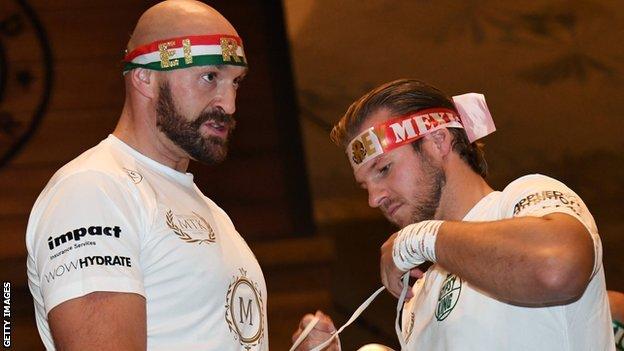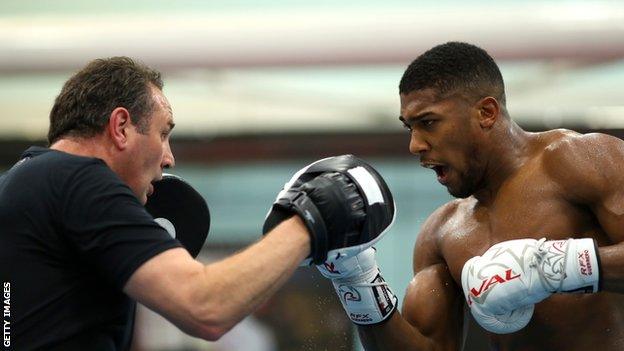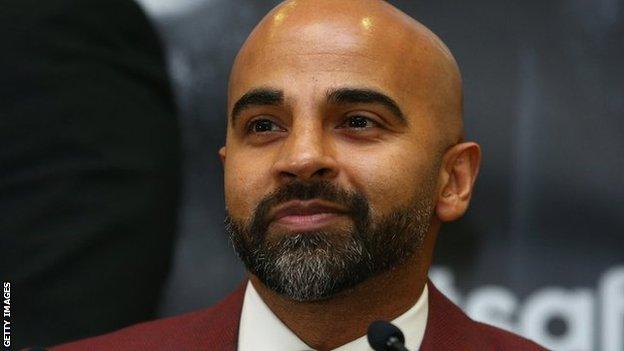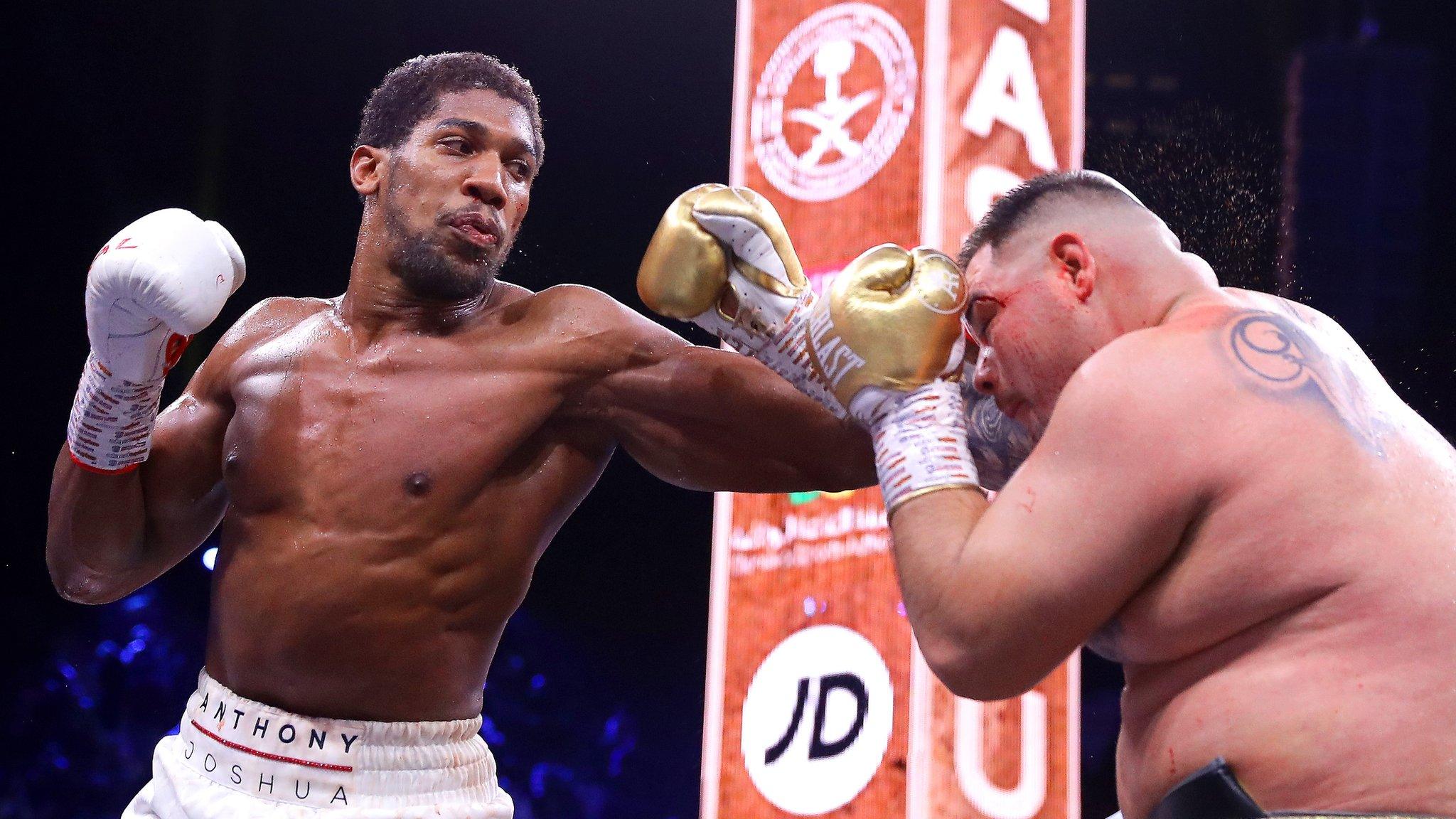Tyson Fury trainer Ben Davison defends Rob McCracken over 'concussion' criticism
- Published

Trainer Ben Davison is preparing Tyson Fury for his bout against Otto Wallin in Las Vegas this weekend
Tyson Fury v Otto Wallin |
|---|
Venue: T-Mobile Arena, Las Vegas Date: Saturday, 14 September Ring walks: 04:00 BST approx on Sunday |
BBC coverage: Listen on BBC Radio 5 Live and follow text updates on the BBC Sport website and app. |
Tyson Fury's trainer Ben Davison has joined fighters and pundits in defending Rob McCracken against criticism he put Anthony Joshua's life at risk during his defeat by Andy Ruiz Jr.
Brain injury charity Headway says it is "shocking" that trainer McCracken told 5 Live Boxing he "knew Joshua was concussed" during his loss to Ruiz in June.
McCracken, 51, has said it was not the term he meant to use.
"I don't think the people who have criticised Rob have any knowledge or experience of boxing," Davison told BBC Sport.
"When a fighter goes down I would imagine that has some form of concussive effect every time.
"If Rob is to get pulled up and blamed or criticised then I need criticising too because Tyson got knocked down against Deontay Wilder in round nine and 12 and I allowed it to carry on. So if he is getting criticised I need it as well."
Former world heavyweight champion Joseph Parker told BBC Sport: "Joshua was still communicating so I don't think it was a bad decision Rob made. I think the wording is what people don't like.
"When I fought Dillian Whyte I can relate to this. I got head-butted in the back of the head and I was like 'what round is this? What happened to me?' I didn't want the fight stopped. My coach knew it wasn't time."
'An outrageous statement' - Bunce

Headway says McCracken failed to protect Joshua from a "potentially fatal injury"
The British Boxing Board of Control has backed McCracken., external
Joshua was floored twice in round three and twice in round seven against Ruiz, who picked up the IBF, WBO and WBA world heavyweight titles at Madison Square Garden.
During the fight, Joshua asked McCracken between rounds what round was next, and before the seventh, asked: "Why am I feeling like this?"
Headway says McCracken's assertion that his charge fought on concussed showed the trainer's "sole priority was on winning the fight" rather than protecting Joshua from "a potentially fatal injury".
The organisation also said concussion protocols in boxing "are not worth the paper they are written on".
BBC Radio 5 Live boxing analyst Steve Bunce said: "That is an outrageous comment for any organisation to make about boxing, especially in Britain, where the British Boxing Board of Control are the leading body when it comes to boxer care.
"They are constantly reviewing fighters. In my view, that is an unnecessary remark. I am slightly outraged by that as it is far too strong.
"What happened here, McCracken simply chose the wrong word. He could have said Joshua was dazed, stunned, or the word we so often use in boxing, gone. They all fall way short of concussion, a serious word. I truly believe he used the wrong word."
The end of combat sports

Dave Coldwell trained Tony Bellew and now works with the likes of Anthony Fowler and Jordan Gill
In July, Russian Maxim Dadashev and Argentine Hugo Alfredo Santillan became the 11th and 12th high-profile fighters to die as a result of injuries sustained in the ring over the past decade.
McCracken has notably let fighters continue after heavy knockdowns in the past, with Joshua recovering to stop Wladimir Klitschko in 2017 and Carl Froch rallying to overcome George Groves in 2013.
Asked how boxing would survive if fighters were removed from bouts if they are concussed, Dave Coldwell, who trained Tony Bellew and now works with the likes of Anthony Fowler and Jordan Gill, said: "It would be the end of boxing.
"All combat sports, it would be the end. This is why people choose to box and others don't.
"Sometimes a fighter will come back and isn't concussed and will ask what round we are in as he is that wrapped up in a fight.
"There have been times where you think someone needs pulling out and then suddenly they go out in the next round and are fresh as a daisy and pull it back."
'I was concussed'
Head trauma is a fiercely debated topic in sports, with football, both codes of rugby and cricket all boasting varied concussion protocols.
Former European bantamweight champion Spencer Oliver told BBC World Service: "When I had my first European title defence I didn't realise I was concussed but I must have been.
"The doctor came in and asked me simple questions. I couldn't for the life of me work out what day it was. She said if I got it wrong a second time I would go to hospital. She asked me again and I guessed and got it right."
Oliver, who was placed in a coma after being injured in a fight in 1998, added: "I have known Joshua since day one, when he gets hurt he takes a few rounds [to recover]. So I understand what Rob was thinking.
"He was clearly concussed, we all saw that. But if I was in the same situation I'm not sure I would have pulled Joshua out."
Analysis
Dan Roan, BBC sports editor:
Within just four bleak days for boxing in July, Russian Maxim Dadashev and Argentine Hugo Alfredo Santillan became the 11th and 12th high-profile fighters to die as a result of injuries sustained in the ring over the past decade, sparking renewed debate over the safety of the sport.
So it is inevitable that Rob McCracken's comments have caused concern, especially given his status as the most senior coach in British boxing.
Many will have sympathy for him, arguing that the ability to recover from head injuries has always been an unavoidable part of the sport and that, realistically, boxing cannot apply the same protocols to concussion seen in other sports, where athletes are withdrawn from the action to medical undergo tests, before being allowed to continue.
Others however, will worry that McCracken has shown precisely why trainers and the referee cannot always be relied upon to know when a fighter has had enough, and that boxing needs to do more.
In amateur and Olympic boxing for example, referees have more scope to intervene, stepping in when a boxer is hurt. In professional boxing, they must wait until a fighter is no longer able to defend themselves. Could shorter bouts - or ringside doctors directly intervening to stop fights - be among the answers?
What is certain is that at a time of mounting debate around the perils of repeated head injury, there seems to be no easy answer for combat sports like boxing.
- Published7 December 2019
